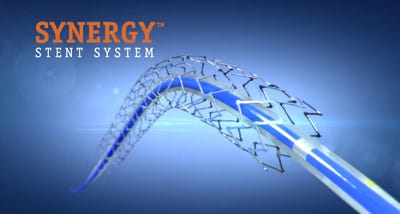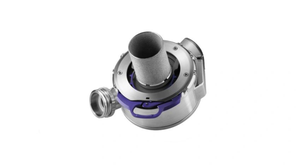November 4, 2016
One-year results from a clinical trial comparing drug-eluting stents from the company and two of its competitors suggest maybe not.
Maureen Kingsley
 One-year results are in for the ongoing large-scale, Netherlands-based Bio-Resort clinical study comparing the safety and effectiveness of three big-name drug-eluting stents head to head.
One-year results are in for the ongoing large-scale, Netherlands-based Bio-Resort clinical study comparing the safety and effectiveness of three big-name drug-eluting stents head to head.
To Medtronic's delight, after one year its conventional durable-polymer Resolute Integrity stent demonstrated results equal to those of Boston Scientific's unique bioabsorbable-polymer Synergy stent (the only FDA-approved stent of its kind) and Biotronik's BP Orsiro stent, which is expected to earn FDA approval in 2018.
"At one year, patients with coronary artery disease who were treated with a biodegradable polymer stent showed no clinical benefits over patients treated with Resolute Integrity," Medtronic crowed in its press release announcing the results.
Boston Scientific's Synergy stent carries a heftier price tag than its durable-polymer counterparts, reports the Star Tribune of Minneapolis.
Boston Sci touts the Synergy as the stent of choice for improved arterial healing and reduced patient polymer exposure. At the one-year mark, however, Bio-Resort investigators reported that the Synergy stent did not appear to offer any advantage over its competitors. Boston Scientific's executives, on the other hand, maintain that the Synergy stent, which is coated with a unique biodegradable polymer that is absorbed by the body within three months along with the eluted drug, will eventually show its value over time by "theoretically cutting health problems linked to coatings that linger for years" on other stents, the Star Tribune story explains.
While today's commercially available stents are coated with drugs to promote vessel healing, studies have suggested the long-lasting polymer coatings that slowly release the drugs might actually delay that healing by promoting inflammation of tissues. Degradable, bioabsorbable polymers are intended to correct this problem, and it is possible that they do in the long term.
The Bio-Resort trial follows about 3500 Dutch patients who were randomized in equal proportion to Boston Scientific's Synergy stent, Medtronic's Resolute Integritystent, or Biotronik's Orsiro stent. This type of trial design, pitting medical devices from three different brands against each other to see how they stack up, is "somewhat uncommon for medical device companies," the Star Tribune story points out, in that the brands in question are paying independent researchers to randomize patients to one of three products and gather data on them for years.
It is more common for clinical trials to compare new devices to drugs, surgery, or a company's own previous iteration of a device.
Interestingly, one day after announcing the one-year Bio-Resort results, Medtronic shared initial clinical outcomes of its new polymer-free drug-eluting stent from the ongoing RevElution clinical trial, which compares the polymer-free stent to a current-generation stent. According to the press announcement, the polymer-free stent "met its primary endpoint of in-stent late lumen loss at nine months compared to a current-generation drug-eluting stent, and also demonstrated positive clinical outcomes."
Maureen Kingsley is a contributor to Qmed.
Like what you're reading? Subscribe to our daily e-newsletter.
[Image courtesy of Boston Scientific]
About the Author(s)
You May Also Like


